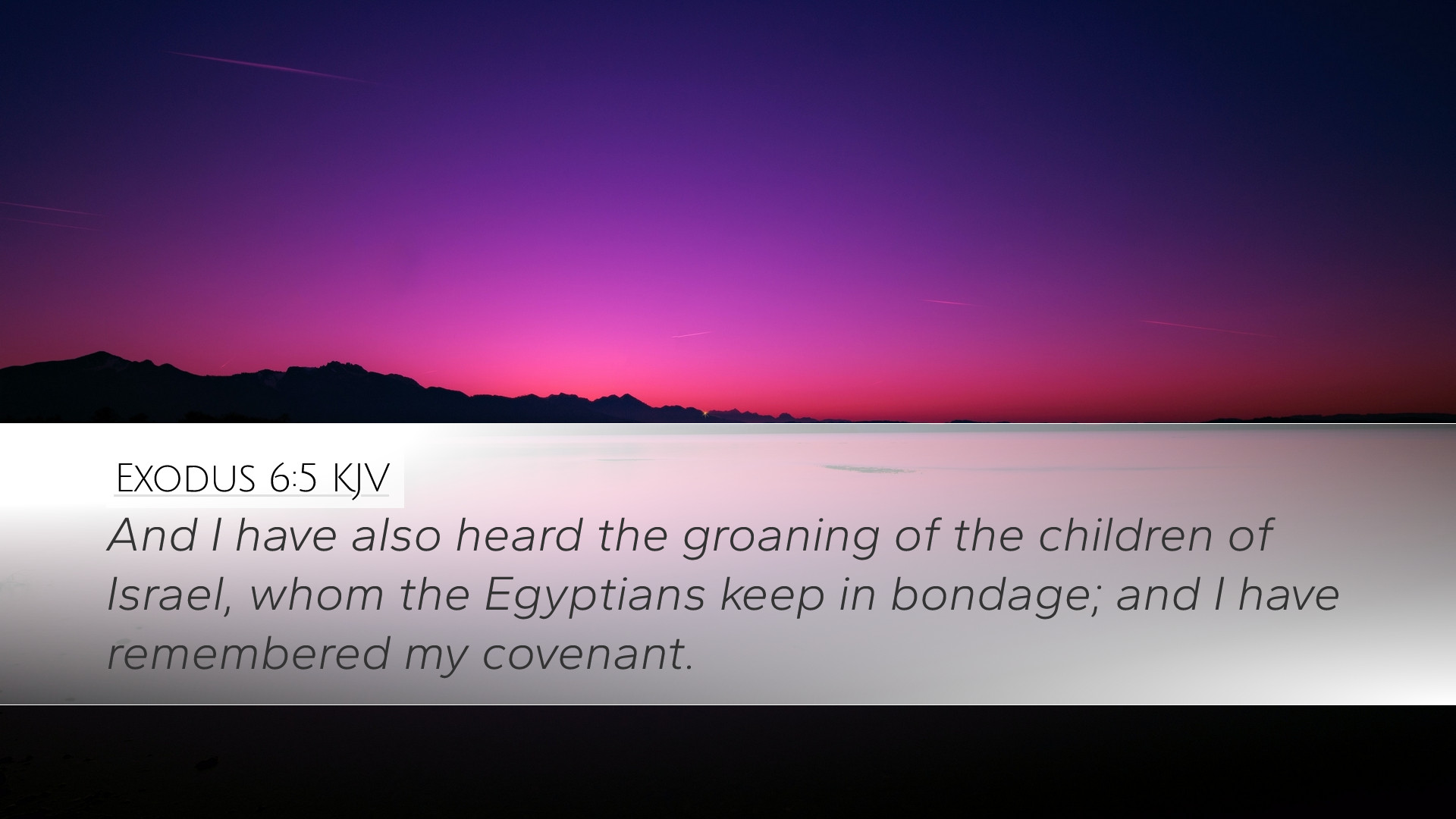Exodus 6:5 Commentary
Bible Verse: "And I have also heard the groaning of the children of Israel, whom the Egyptians keep in bondage; and I have remembered my covenant."
Introduction
This verse is a pivotal moment in the narrative of Exodus, where God reassures Moses of His intentions to deliver the Israelites from their oppression in Egypt. This commentary synthesizes insights from various public domain commentaries, providing a rich, theological interpretation suitable for pastors, students, and scholars alike.
Contextual Background
Exodus 6:5 occurs at a critical juncture in the Exodus narrative. Moses has returned to Egypt to lead the Israelites out of slavery, but faces opposition and doubt both from Pharaoh and his own people. Up until this point, God's promise seemed distant and unfulfilled. The mention of God's "remembering" indicates a divine response to the cries of His people.
The Significance of "Groaning"
The groaning of the Israelites reflects the deep suffering and anguish they experienced under Egyptian rule. As Adam Clarke notes, this deep emotional state was a cry not just for relief, but for divine intervention. It was a manifestation of their faith, rooted in the covenantal promises made to their forefathers.
The Divine Response
God’s declaration that He has "heard" signifies His active engagement in human suffering. As Matthew Henry points out, this acknowledgment serves to bolster the Israelites’ faith. It assures them that God is not indifferent to their plight; rather, He is attentively listening and will act according to His covenant.
The Covenant Remembered
The latter part of the verse states that God has "remembered" His covenant. This is a critical theological point. Albert Barnes expounds that this remembrance is not about human forgetfulness but rather about God's faithfulness and timing. God’s covenants are enduring, predicated on His character, and not merely contingent upon human behavior.
Theological Implications
This verse illustrates several key theological themes, including the nature of God as compassionate, the significance of covenant, and the interplay of human suffering and divine deliverance. Each of these themes provides ample material for deeper reflection and discussion.
The Compassion of God
God’s compassion is evident; He is responsive to the sufferings of His people. In this context, the groaning of the Israelites becomes a catalyst for divine action. Clarke reminds us that God acts motivated by His love and desire to bring liberation and restoration to His people.
The Importance of Covenant
Covenant is a central tenet of biblical theology, and in this instance, it underscores God’s unalterable commitment to His people. As seen in Barnes’ commentary, God’s covenant with Abraham, Isaac, and Jacob establishes a historical continuity that reinforces His plan for redemption through the nation of Israel.
Applications for Today
The lessons gleaned from Exodus 6:5 resonate profoundly in contemporary contexts. Here are some key applications:
- Encouragement in Suffering: Just as God heard the cries of the Israelites, He hears our cries today. Believers can find comfort in knowing that God is attentive to their struggles.
- The Assurance of God’s Promises: This passage reminds believers to hold fast to the promises of God, especially during times of doubt and distress. His faithfulness is not conditioned by human circumstances.
- Promoting God’s Justice: The plight of the oppressed calls Christians to advocacy and action. We are encouraged to align ourselves with the suffering and work towards justice, reflecting God's character.
Conclusion
Exodus 6:5 is rich with theological significance and practical application. It not only shows God's commitment to His covenant but also serves as a reminder of His compassionate engagement with human suffering. For pastors, students, and theologians, this verse is a profound affirmation of faith, urging us to trust in God's timing and remain steadfast in our hope for redemption.


